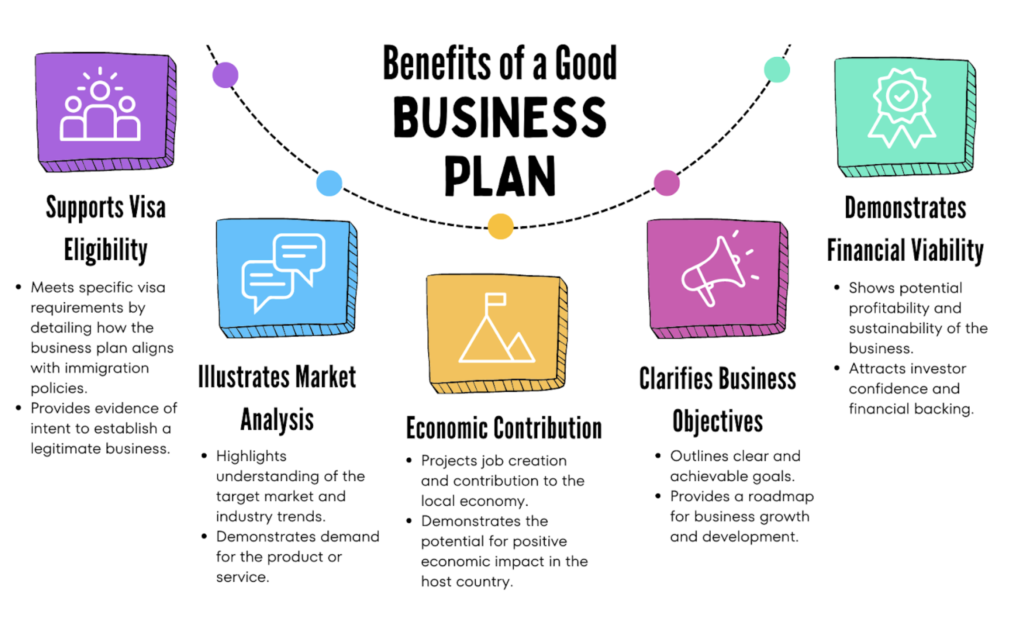Crafting a Comprehensive Business Plan for E2 Visa Application
A well-crafted business plan is your ticket to starting a successful business in the U.S. on an E2 Visa. The E2 visa for investors from treaty economies permits foreign nationals to travel to the U. S to manage and establish a business in which they have made a significant investment.
When preparing your business plan make sure that it is well developed to convince the immigration officials that your business idea is viable and could be very profitable. In this article, we will highlight the important points and approaches that you should take for preparing a persuasive business plan for an E2 Visa application.

Importance of a Business Plan for the E2 Visa
The U.S. Citizenship and Immigration Services (USCIS) and consular officers pay much attention to the business plan to verify whether it complies with the E2 visa criteria. The business plan needs to demonstrate that the enterprise is not marginal, and is capable of generating more than enough income to support the investor and their family. It also has to show that the investment is adequate and that the investor shall participate in the management of the business.
Key Components of an E2 Visa Business Plan
An effective e2 visa business plan contains several important components. Knowing and familiarizing yourself with how these factors work and how they should be prepared can help you in making the right next steps for your business venture. These are the following:
Executive Summary
The executive summary section is the most critical part of your business plan. It offers an idea of the operations of the business by highlighting aims and objectives, the nature of the business, and why it will succeed. It should include:
- Brief background of business and what it offers to its customers
- The business’s mission statement
- Market and Competitor Analysis
- Key financial projections
- The funds that are invested and where these funds are from
Business Description
This section provides further details on the activities of your business, the sector it belongs to, and its legal status. Include:
- The name of the business, its location, and business formation type (e.g., limited liability company, corporation).
- A comprehensive list of the products or services offered
- The business model and revenue streams:
- The business background if the business is already existing
Market Analysis
A thorough market analysis shows that you have a deep understanding of the industry and target market. This includes:
- Industry background and trends
- Target market and their requirements
- Market size and growth projections
- The analysis of competitors and their market positions
- Customer Acquisition and Retention Strategy
Organization and Management
This section provides information on the business structure and the management team’s experience. Include:
- An org chart depicting the hierarchical structure of the organization
- Biographies of the management team with emphasis on their background and responsibilities
- Advisory board or consultants, if applicable:
Products or Services Line
Describe in detail the products or services your business offers. Include:
- Product lifecycle and any plans for future development
- Unique selling propositions (USPs)
- Research and development activities
- Intellectual property (e.g., patents, trademarks)
Marketing and Sales Strategy
A proper marketing and sales plan is essential to show stakeholders how the business will acquire customers for its products. Include:
- Pricing strategy
- They include sales strategies and methods of distribution (online, retail, direct selling, etc. ).
- Marketing and advertising plans
- Relation to Customer Service and Customer Retention
Funding Request
When proposing additional funding, state your funding needs and how the money will be utilized. Include:
- Current funding requirements
- Action plan for future funding in the next five years
- For instance, on the use of funds (capital costs, operating expenses).
- Business financing and repayment or return plan
Financial Projections
This aspect is important because financial projections help to demonstrate the feasibility of your business. Include:
- Forecast income statement (earnings and expenses) for the future three to five years
- Cash flow statement
- Balance sheet
- Break-even analysis
- Financial assumptions and explanations
Appendix
An appendix contains documents that support the information that has been presented as well as any other relevant information. This can include:
- Resumes of key management
- Letters of intent or contracts with the customers or suppliers
- Contracts that include tenancy agreements, licenses, and other legal instruments.
- Other considerations that support your business plan
Crafting a Convincing Narrative
When developing your business plan, make sure your story is interesting and believable. Here are some tips to ensure your business plan stands out:
Be Clear and Concise: It is important not to use technical terms and complicated words where they are not necessary. The idea is to make people understand your business idea as well as possible.
Use Data and Evidence: Ensure that you substantiate your claims with empirical evidence. Support your statements with market research findings, industry analysis, and financial projections.
Showcase Your Expertise: Emphasize your credentials and those of your managerial team. Convey the message that you possess the skills and knowledge that are required to make the business prosperous.
Emphasize the Benefits: Ensure that you outline and clearly describe the opportunities in the market that your business will be addressing.
Plan for Growth: Describe your vision and plan for future development. Immigration officials need to be convinced that your business has the potential to expand and provide employment.
Legal and Compliance Considerations
Ensuring that your business plan adheres to all legal and compliance requirements is crucial for the success of your E2 visa application. Here are some considerations:
Business Formation: Make sure that you have registered your business and have all necessary permits and licenses.
Investment Legitimacy: Ensure that you provide evidence that the sourced investment funds are legal proceeds from lawful activities.
Operational Compliance: Make sure your business adheres to the legal requirements in your area and your industry.
Consulting with Professionals
Due to the numerous challenges that are likely to be encountered while applying for an E2 visa, it is advisable to seek the services of E2 visa business plan specialists. These can include:
Immigration Attorneys: They can help you ensure that your business plan complies with all the E2 visa requirements and assist you with the legalities of the process.
Business Consultants: Common services include business planning and development, market research assessment, financial forecasting, and strategic consulting.
Accountants: They can help with budgeting to make sure that the numbers you’re coming up with are reasonable and sound.
Conclusion
Writing a good business plan is one of the key steps when applying for the E2 visa to start a business in the United States; a well-thought-out plan proves the feasibility and possible success of the business and the candidate’s concern and readiness. Hence, by providing detailed sections on the business description, market analysis, management structure, marketing strategies, and financial projections alongside ensuring that all legal requirements are met, one can develop a business plan that improves the E2 visa likelihood.
Remember, clarity, detail, and realism are the guidelines for a successful business plan. Back up your story with numbers and evidence, demonstrate your competence, and outline your strategies for expansion. If you plan well and get advice from the right people, you can make your business idea a success in the United States.
FAQs
What are the important components of an E2 visa business plan?
The general outline for an E2 visa business plan should comprise the following key sections: Executive summary, business description, market analysis, organizational structure, product or service description, marketing and sales strategy, request for funding, projected financial statements, and appendices. All these factors combined show that the business is feasible and may prove successful in the long run.
How specific should the financial forecasts have to be for the business plan when applying for an E2 visa?
The company should prepare realistic and specific forecasts for at least three to five years from the current year, including income statements, cash flow statements, and balance sheets. Presenting the business’s break-even analysis and the explanation of financial assumptions also contributes to the evidence of the business’s sustainability.
Is it possible to draft the E2 visa business plan independently or should one hire an attorney?
An applicant can write the business plan alone, but consulting with immigration attorneys, business advisors, and accountants can help develop a successful business plan that meets all the guidelines and improves an application. Business consulting can then advise you on how to write a better and more feasible business plan and thus increase your likelihood of getting the visa. professional assistance in writing a better and more realistic business plan that will increase your chances of getting the visa.








